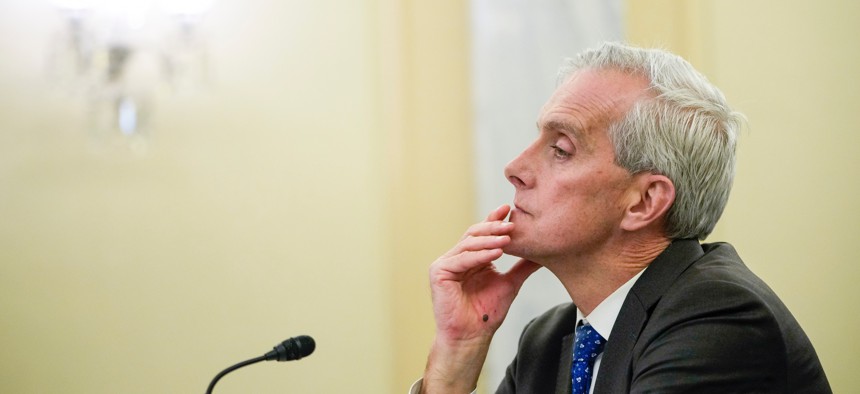
VA Secretary Denis McDonough said that the agency will continue to look to automation technologies to meet growing PACT Act benefits claims. Drew Angerer / Getty Images
VA secretary: Automation will help agency ‘make better, faster, more informed decisions’
VA Secretary Denis McDonough said the department is poised “to deliver a completely new, fully integrated experience” for veterans as officials expect a further increase in PACT Act claims.
The Veterans Affairs Department has launched numerous modernization efforts in recent years to enhance its veteran-facing services, but more must be done to meet the coming deluge of PACT Act-related benefits claims — including using more artificial intelligence tools to bolster existing processes — VA Secretary Denis McDonough said at the DigitalVA Expo Thursday.
The PACT Act, which was signed into law by President Joe Biden last August, increased the number of veterans and their family members eligible to receive benefits as a result of exposure to burn pits and other toxic substances. A VA official said during a media roundtable last month that over 560,000 disability benefits claims had already been filed since the law’s enactment.
While McDonough noted the department’s progress in modernizing and enhancing many of its digital and telehealth services, he said conducting a simple task — such as having a veteran update their personal information — “in too many cases still requires visits to multiple outdated websites.”
As the VA experienced a surge in telehealth visits as a result of the coronavirus pandemic, the department worked to streamline many of its disparate claims, benefits and health services into a centralized mobile app that launched in July 2021.
With VA’s backlog of benefits claims expected to peak later this year as a result of the PACT Act, McDonough said the department must continue “building on the innovation that our providers have led” over the past several years, since “we don’t have a choice.”
He said this includes prioritizing technologies that will allow the department to speed up its claims processing timeframe while also reducing system outages and downtimes — efforts that have been bolstered by VA partnering with private sector companies “to leverage best practices in AI, natural language processing, machine learning [and] robotic process automation technology.
“That means using automation to help us make better, faster, more informed decisions, improving veteran health outcomes and benefits decisions, while eliminating redundant administrative tasks and workflows and promoting jointness across VA — including with our federal and community partners,” McDonough added.
A report released by the VA Office of Inspector General earlier this month noted that the Veterans Benefits Administration, which oversees veterans’ benefits programs within the department, plans to use IT system modernization tools and automation to help meet the influx of PACT Act claims.
The report’s release came after lawmakers on two House Veterans’ Affairs subcommittees also called earlier this month for the department to speed up its deployment of advanced automation tools to help reduce menial tasks that could prolong the processing of veterans’ claims.
McDonough said VA is “early in this journey” when it comes to using more advanced technologies and automation, but that the department is poised “to deliver a completely new, fully integrated experience in which the support vets need is just a few clicks away.
“These emerging technologies promise to serve more veterans more efficiently, more effectively, more equitably and more accurately,” he added.







